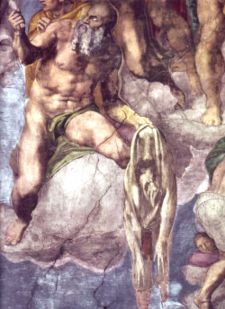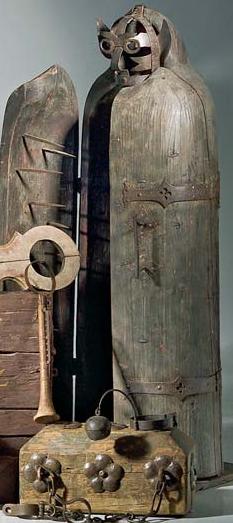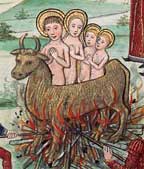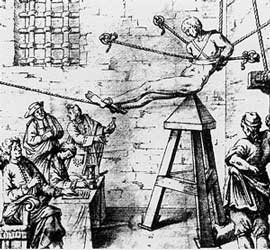






All of these are real devices/methods used by official sanction, both secular and religious, at various points in history. Men who thought they were doing what needed to be done invented, ordered, and administered these punishments. While many of the people involved were no doubt considered sick bastards even during their own time, many were just people. Could be you, could be me, if times and attitudes of enlightenment in the surrounding culture were different.
Just men. Ordinary men in primitive times.
Times that are heavily reflected in the milieus we choose to role-play in.
I could make this one of those "controversial posts" about how, in cultural context, Lawful Good characters could indeed find the use of these devices and methods justified without endangering their alignments. Paladins in particular. But I'm quite content with the idea that people we would label as "Good" within a game might indeed be "Good" as we, and not our characters, would understand the term.
What makes this interesting to me is that in ancient and medieval times, such punishments were invented by ordinary people. Even if we accept the idea that this was all the domain of only the most extraordinarily cruel and vicious and depraved examples of humanity, no matter the inspiration, it's still just a product of man.
The supernatural exists, by definition, in fantasy role-playing games. Demons and devils and millennia old dragons and twisted elves and goblins and trolls and undead spirits exist, and are all supernaturally evil in ways man can not be. (I'm now thinking Hellraiser is an inspiration; at least it's flashing heavy in my mind right now.) Their plots and aims and ideas of justice and "just" punishments - to say nothing of what the philosophies of the unspeakably cruel, by comparison, examples of their kind would be - must be far beyond human ability to comprehend.
Or, in terms of a role-playing game, imagine and present as an in-game element, narrative or otherwise.
I guess this is why I largely make the "bad guys" in my games human. Humanoids, especially the smaller ones, are easy enough to grasp (add in the National Geographic-inspired imagery of a pack of wolves running down and devouring an elk to a cannibal humanesque cruelty), but the smart creatures? The mind flayers and gith and abeloth and the rest? I wouldn't know how to accurately portray that sort of thing. To me, assigning wholly human traits to the supernatural, a la classical mythology, is rather lame and selling the entire concept of otherworldly beings far, far short.
So they show up in my games, but always incidentally, always for rather unexplained or even seemingly stupid reasons (the players might as well treat them as random).
I suppose this might be one reason I wasn't outraged by Carcosa. If anything, it seemed tame to me in that the rituals were so obviously human-borne cruelty rather than the setting-explained result of Snake-Man experimentation. It should have been far, far worse, but we as writers literally lack the words to describe sadism we can't even comprehend in the first place.
It also occurs to me that so many RPG campaigns, perhaps in an effort to make things seem more epic, skip over antagonistic human elements and base any plots or quests on direct supernatural plotting or activity, where perhaps sorcerous (or clerical...) manipulation of those elements might seem more "true," and not revealing so much of the outer worlds in such concrete, gameable, human terms as is necessary if the personalities, circumstances, and lairs of the dimensional others are to be instigators. But "Stopping the Dark Lord GGrrnnargh" is somehow more appealing and urgent and satisfying a quest than, "The wizard Apost'Rophe is going to summon and bind a demon, we must stop him!"
It's a shame that all those "outer planes" spells from AD&D don't much get used. But why would they, when early on it was established that demons walk the Earth (or Oerth, to be more accurate) just because, and the characters meeting them were supposed to be high enough level where fighting them was possible. So why deal with the mumbo-jumbo when the objects of the mumbo-jumbo were already there? In a different world Tsojcanth would have had different effects.
Evil is a tough thing to get one's mind around. And so, perhaps, are rambling posts.
(images from here)

Great post, thanks!
ReplyDeleteThe ambiguity and transience of human morality is one of the reasons I've really underplayed alignment as a moral code, and more of a work ethic, or legal code. The nine-alignment system, in its very breadth, has become too confining, whereas the 3 alignments of OD&D/B/X (Chaotic/Nuetral/Lawful) work better, imo, at giving the players more a team to root for than a system of behavioral control.
It would be interesting to have a way (in-game) to delineate the absolute evil of the supernatural from the more situational evil of mankind.
Humans have the amazing ability of creating "demons" by demonizing others out of fear and misunderstanding. Yes, sometimes we demonize out of hatred, but sometimes we do it because we are motivated by what we perceive to be a higher good.
ReplyDelete"It became necessary to destroy the village in order to save it."--an American Army Major in Vietnam
Getting back to the game, I believe that D&D and similar games work best with a human-centric perspective for this very reason. Humans are capable of the noblest good and the most vile evil.
Awesome post! Great stuff.
ReplyDeleteWhen contemplating supernatural evil, I tend to move away from the death-and-dismemberment that is part-and-parcel of human evil, and move towards either body horror of a different sort (the blue slaad whose bite slowly transforms you into a red slaad) or more emotional or spiritual agonies.
I personally have never had a problem with Paladins who are evil by modern standards, throwing a potential witch of off a cliff as a test was fine, if she flew away she was evil and could no longer corrupt the town and if not she died a lawful good death and goes to heaven. Win win in medieval mindset.
ReplyDeleteI believe that the Hellraiser analogy is a great way of looking at this topic, especially when looking only at the first movie.
ReplyDeleteVirtually any sentient supernatural evil could be set into a Hellraiser-cenobite frame of mind: vicious, selfish, cruel and maybe even a bit naive.
Taking this idea further,human ways may appear backwards, simple or just plain obtuse and getting rid of the human problem might seem, from a certain point of view, as a noble thing, scraping a parasite off of the planet. Thus making evil only a perceptual concept: Mind Flayers eat human or dwarf (or most any other) brains not out of being evil, but because to them we are merely sheep, they are doing what they can to survive, while to others this is a horrific and evil act, to a mind flayer it is just dinner.